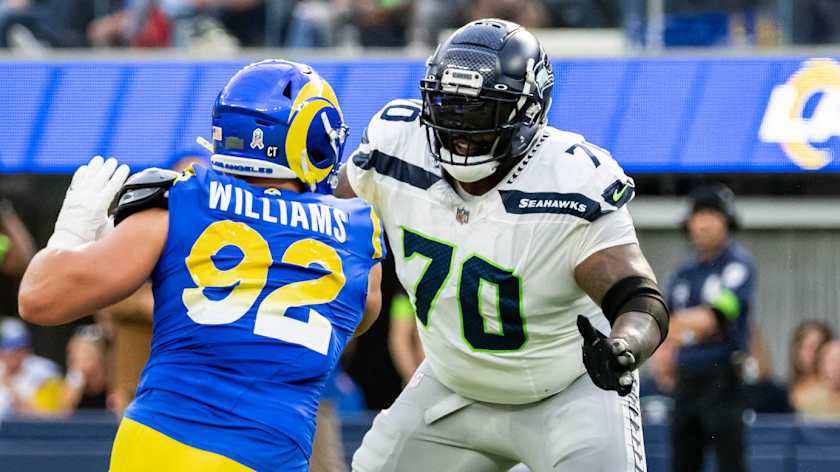The Seattle Seahawks recently made waves by signing veteran offensive tackle Jason Peters to their practice squad, a move that has sparked significant controversy among NFL fans and analysts. The 41-year-old Peters, who has had a storied career spanning almost two decades, brings a wealth of experience and skill to the Seahawks’ offensive line. However, the decision to bring him on board has raised eyebrows due to his age and the broader implications for Seattle’s offensive line strategy.
Jason Peters is a future Hall of Famer with a decorated resume that includes nine Pro Bowl selections, two All-Pro honors, and a Super Bowl title with the Philadelphia Eagles in 2017. His reputation as one of the league’s most dominant offensive tackles precedes him. Yet, as Peters approaches the twilight of his career, questions surrounding his ability to contribute at a high level have emerged. Signing a 41-year-old to the practice squad, particularly for a physically demanding position like tackle, has led to a debate about whether this is a wise move for Seattle or a short-term stopgap with little long-term benefit.
One of the primary sources of controversy comes from the Seahawks’ current state of offensive line play. With injuries plaguing the team early in the season, including to starting tackles Charles Cross and Abraham Lucas, Seattle is in desperate need of reinforcements. Peters is expected to provide depth and stability, but his advanced age and history of injuries have some questioning whether he can still perform at an elite level. Critics argue that instead of relying on aging veterans, the Seahawks should be focused on developing younger talent, potentially securing the future of the offensive line.
Another point of contention revolves around Peters’ role on the practice squad. For a player of his caliber, being placed on a practice squad is unusual, as Peters has spent his entire career as a starter. This has led to speculation about how much the Seahawks actually plan to use him in game situations. Some believe that the signing is more of an insurance policy, and Peters may only see the field in emergency scenarios. However, if the Seahawks find themselves in dire need of offensive line help due to continued injuries, Peters could be elevated to the active roster and thrust into action.
Fans and analysts have expressed mixed reactions to the move. Supporters of the signing point to Peters’ extensive experience and leadership as invaluable assets for a team dealing with adversity. His knowledge of the game and ability to mentor younger players could benefit the Seahawks in ways that go beyond his on-field performance. On the other hand, skeptics argue that the team should be looking to the future and question whether Peters, at his age, can effectively protect quarterback Geno Smith and contribute meaningfully to a playoff push.
Seahawks head coach Pete Carroll has defended the decision, emphasizing the need for stability and experience amid the team’s current injury woes. “Jason brings a lot to the table,” Carroll said in a press conference. “He’s seen everything there is to see in this league, and he’s still got the desire to compete. We believe he can help us, whether it’s in practice or on the field.”
Peters, for his part, has expressed excitement about joining the Seahawks and the opportunity to contribute to a team with postseason aspirations. “I still have a lot left in the tank,” Peters said after the signing. “I’m here to help in any way I can, whether that’s playing, mentoring the younger guys, or just being ready when my number is called.”
The signing also highlights the broader trend in the NFL of teams turning to veteran free agents late in their careers to fill immediate needs. As injuries mount and the season grinds on, experienced players like Peters offer teams a short-term solution. But the question remains: will this be enough for the Seahawks to address their offensive line issues, or is it merely a temporary fix that delays the need for a long-term answer?
As the Seahawks push forward in a competitive NFC West, only time will tell if signing Jason Peters was the right move. The controversy surrounding the decision reflects the larger dilemma NFL teams face when balancing immediate needs with long-term development. For now, Peters’ addition adds a new layer of intrigue to Seattle’s season, and his role in the team’s success or failure will undoubtedly be closely watched in the coming weeks.
